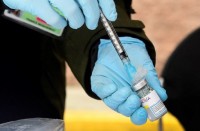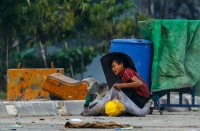By Dr. Ma. Angela Leonor Aguinaldo
Contributor/columnist
I lost a close relative to Covid-19 this past week.
It was unexpected. His family thought that he would make it but he did not. Sadly, this occurrence is not anything new. There is this stark reality that even with a sliver of hope, Covid-19 hits us where it hurts the most. Indeed, the news of my relative came along with other posts from close friends, relatives, and acquaintances in social media sharing their grief, pain, and frustration because a family member, a friend, or a loved one has succumbed to the virus. It does not matter if you are healthy or with comorbidities, or whether you are rich or poor, because the virus does not discriminate. And as these cases hit closer to home, one realizes even more how life is truly precarious nowadays and how it can be taken away from us or our loved ones when we least expect it.
One year has passed since the pandemic began. By now, there would have been expectations that things would be better because we had a year already to confront and solve the different problems and issues brought in by Covid-19. In fact, vaccines from different pharmaceutical companies around the world have been made available albeit there have been issues in global distribution. Economic recovery plans have also been set into motion in different countries. On a micro-level, we see societies adapting to the “new normal”, e.g. work from home arrangements, online meetings through different video conferencing programs, online and/or module learning for students, etc. And yet, with all of these changes and adaptation that we have done so far, it would seem that we haven’t gone very far and could not escape the scarring effects of the virus. The virus manages to throw a curveball with either new stronger variants or socio-economic repercussions that not even the best of world leaders, regional organizations, and other policy makers can address with efficacy and efficiency. We thus find ourselves in this lingering standstill, as if the world due to Covid-19 has reached a standstill and without true end in sight.
The pain of the lingering standstill is very much felt. The plight of those being affected can be seen throughout social media and the news. We see entire families wiped out due to the virus. We see orphaned children because they have lost their parents. We see likewise the plight of those who perished because hospitals could no longer admit them due to overcapacity and lack of available rooms and resources. How often have we heard of patients’ stories who succumbed to the virus while waiting to be admitted? And this is not limited to those inflicted with the virus but those who also required medical attention due to other circumstances. My heart breaks for my friend, who most recently shared that his relative had a heart attack and they spent the entire day going from hospital to hospital in hopes that their relative can receive the needed medical attention. It was only at the nick of time — when it was most critical — that their prayers have been answered when she was admitted. It turned out she was also Covid-19 positive and the relatives who laboriously searched a hospital for her needed to be isolated and placed under observation.
Other stories also came into light. I have encountered a post in social media about stories of people choosing to end their own lives when they found out they were Covid-19 positive. Although taking one’s own life should not and should never be an option, they could not bear the hurt of knowing how much debt their families would be should they be treated for the virus. It just shows how desperation can lead people to this which could have been averted if they had the tiniest sliver of hope.. On other occasions we see numerous fundraisers being done through social media because patients and their families are financially strapped and could not anymore shoulder the insurmountable financial costs. Indeed, it has come to light that yes, it is expensive to get sick but it can get more expensive to get sick with Covid-19 especially if you have the most severe of symptoms. Thus, we find ourselves in strife because we no longer know where to run or to whom to run to at these difficult times.
On the other hand, we see those who have lost their jobs or their sources of income due to the economic repercussions of Covid-19 as well as the lockdown restrictions being put in place by governments around the world. Understandably, governments opt for stricter restrictions in movements to control the infection rate and minimize those who might get sick of the virus. And yet, we find how the average labor worker is affected especially if the industry he/she belongs is cannot operate due to these restrictions. Thus, they either cannot earn the needed income to sustain their daily expenses or they altogether lose their jobs. Numerous studies have now come to light about the lingering and scarring effect on the economy by the virus. Some have predicted it would probably take 2-3 years before full recovery can be made. The damage done by the pandemic is like no other experienced before, and economic projections have even showed that unemployment at this time is even worse than the Great Depression of the 1940’s in the United States. Worse, we see inflation rates becoming higher and higher: the Philippines is reportedly now the country in ASEAN which has the highest inflation rate. The price of commodities and groceries are at an all-time high that government needed to place price ceilings for the time being to control the price surge (albeit this price ceiling for example on pork has been already lifted). Thus, imagine the plight of the people who are not only being confronted with the danger of the virus but also the economic strife due to lack of employment or source of income.
As to how we could overcome these challenges, I am honestly at a loss of words. Maybe perhaps as regards the increasing rate of infected and deaths, we should take the responsibility to have ourselves vaccinated if we can. Have yourself, your parents, grandparents, loved ones, relatives, and friends vaccinated. I understand that at this moment, there are many misinformation campaigns against vaccination. In the Philippines alone, there has been a stigma left by the Dengvaxia controversy years ago. Thus, people — especially those who are misinformed or have not been fully informed — are hesitant to be vaccinated even for the simplest of illnesses such as chickenpox, polio, etc. But we need to do it. We all need to be vaccinated. At the end of the day, the benefits of being vaccinated outweigh the fears and uncertainties. We need to get all back to our feet and hit the ground running. Governments around the world are campaigning for vaccination and we, the citizenry, have that responsibility to our fellow citizens and to one another to contribute to the cause.
Further, there should be more aggressive methods and capacity building among hospitals and other medical facilities to accommodate the sick. This is not mutually exclusive to the sick with the virus alone, but likewise those who need the required medical attention. Again, it pains my heart to read of stories that the chances of living by certain patients have been slim due to lack of urgent medical attention. They succumbed to their ailments because they were not given the proper medical attention at the onset. I understand that the government has been trying its best to address these concerns but these concerns need their full-time attention. The overcapacity of hospitals and medical facilities across the country as well as the increasing number of cases only mean that there is still much to do on the government’s part. Stricter measures perhaps would help control the transmission rate of the virus. Partnering up with more organizations would probably be also a good idea. We know by now the pattern these cases take and we should take this data seriously. The first-best cure only comes with the right diagnosis. Governments cannot act on gut feeling and intuition alone. Machismo or “alam ko na yan” attitude at these difficult times does not have and should not have any role to play in policy making. This pandemic is unprecedented. Economic and socio-political studies have repeated this numerous times. Instead, policy making and decision making have to be data-based or science-based. It would only be through a proper understanding of these things would governments know truly the best way possible to overcome the challenges brought by the virus. Further, there ought to be an understanding that behind this data or numbers are human lives that have been placed in peril. Thus, the right course of action is needed to be taken. And when it comes to the courses of action to be taken, there would be naysayers and critics. One cannot please everybody. This applies even to the government’s policies. But as long as governments are able to ground their decisions on the proper diagnosis of the problems, then they could stand their ground and do what they think is right. And perhaps one day, we won’t be in a standstill anymore because we can rightfully live.
==============================================================
 The author, Dr. iur. Atty. Ma. Angela Leonor Aguinaldo, J.D., LL.M., writes a regular column/blog for eaglenews.ph. With her knowledge and expertise in international law, international criminal law, criminology, forensics and digital evidence, issues surrounding law and technology, as well as on ASEAN and EU matters, and her passion to help others understand these complex issues better, she will be analyzing current world issues and even give her take on pop culture. As can be gleaned from the title of her column/blog “The Knightfall Protocol“, “Angel” as her friends and loved ones know her, is a fan of the Arkham games and the caped crusader is her favorite superhero. For comments and suggestions, you can reach her at angelaguinaldo@eaglenews.ph
The author, Dr. iur. Atty. Ma. Angela Leonor Aguinaldo, J.D., LL.M., writes a regular column/blog for eaglenews.ph. With her knowledge and expertise in international law, international criminal law, criminology, forensics and digital evidence, issues surrounding law and technology, as well as on ASEAN and EU matters, and her passion to help others understand these complex issues better, she will be analyzing current world issues and even give her take on pop culture. As can be gleaned from the title of her column/blog “The Knightfall Protocol“, “Angel” as her friends and loved ones know her, is a fan of the Arkham games and the caped crusader is her favorite superhero. For comments and suggestions, you can reach her at angelaguinaldo@eaglenews.ph








